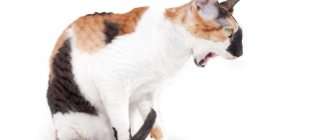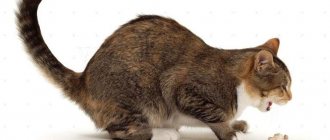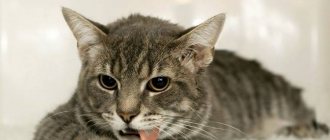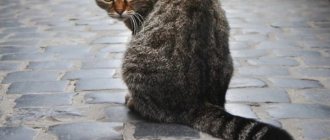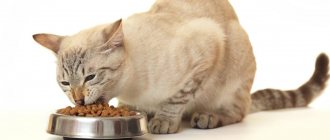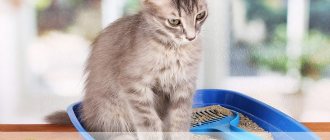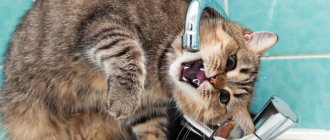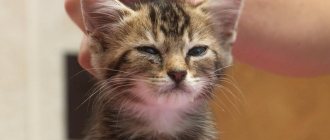September 16, 2019
Vomiting after eating, no matter whether it is dry food or not, has happened to every pet at least once in its life, and it is not always dangerous. However, if such episodes happen regularly, then in no case should you let the situation take its course. Let's understand the reasons for this phenomenon, try to separate the wheat from the chaff and develop a strategy for action if a cat vomits after dry food.
Poor quality diet
This is the first thing that comes to the owner’s mind if he sees that, as soon as he leaves the bowl of dry food, his pet gets rid of what he has eaten. Indeed, like any food product, ready-made industrial rations can deteriorate due to improper storage or after the expiration date. Therefore, it is worth checking the date on the packaging, and also smelling the granules - a sour, rancid smell indicates that the degree of oxidation of fats in the feed has already gone beyond certain limits, and it is better to get rid of such a product.
Burps food
Cats who eat only dry food often burp almost immediately after eating. When dry food mixes with the contents of the stomach, it expands and causes discomfort.
Something as harmless as a form of dry food can cause spit up. Try different forms of dry food to see if your kitten can handle pellet-shaped food versus star- or square-shaped kibble.
© shutterstock
Food intolerance
This condition develops due to the inability of the body's enzyme system to digest one or another component of dry food. As a rule, it occurs immediately upon a new diet and is accompanied not only by vomiting, but also by diarrhea. Is food intolerance a signal for an immediate diet change? Not always.
Very often, the pancreas simply needs time to adapt to the new diet and begin producing enzymes in the required quantities. For example, if your cat previously ate dry food with a low meat content for a long time, and now you decide to switch it to a diet with a large amount of meat ingredients, then naturally the stomach cannot digest it right away. That is why it is recommended to make the transition to a new diet gradually, gradually mixing the new food into the old diet and increasing its share every day until complete replacement.
In some cases, the process may be helped by taking enzyme preparations as prescribed by a veterinarian. You should also consult with him if the transition is carried out correctly, but the vomiting does not stop, in order to identify the component causing food intolerance and avoid it in the future.
Differences between vomiting and regurgitation
A cat's vomiting of undigested food is the most common sign of illness. There are processes that look similar to vomiting, but which are not vomiting. The owner should differentiate between regurgitation and vomiting in order to describe the symptoms to the veterinarian. This is what will help the doctor make the correct diagnosis.
Vomiting is a reflex eruption of stomach contents. Its predecessor is nausea, which worries the animal. The cat begins to meow and back away, as if it cannot find a place for itself. At some point the pet hunches over and lowers its head. The owner may notice excessive salivation. Vomiting is accompanied by characteristic sounds. The masses contain remnants of undigested food, as well as bile.
Attacks occurring once every 4-5 days are considered normal. However, to understand the causes of vomiting, you need to reconsider your pet’s diet.
Sometimes cats vomit food, but owners mistake it for vomiting. Regurgitation is a process that occurs due to a spasm in the stomach. It begins immediately after eating or drinking water. Before and during regurgitation there is no salivation and nausea. The food comes out undigested, with an unpleasant odor and streaked with blood.
Most often, regurgitation is not of a threatening nature, but if the process is repeated several times a day, then the pet should be shown to a doctor.
Cat vomits from overeating dry food
This is a very common cause of vomiting after dry food, resulting from excessive fullness of the stomach, which cannot cope with the digestion of a large volume of food. Such situations arise among owners who do not adhere to the daily norms of dry food recommended by the manufacturer and pour granules into a bowl without measure, and most often among those who really like to feed their pet tasty food throughout the day. In such situations, dry food, as a rule, becomes only the last straw that overflows the “cup of patience” of the stomach.
Establish a feeding regime for your pet and do not overfeed your cat, because this risks not only vomiting, but also serious diseases caused by excess weight and obesity.
How to understand that the body is dehydrated
The Murkoshi team of specialists would like to draw your attention to the fact that the danger of vomiting for a kitten lies, among other things, in dehydration and imbalance of water and electrolyte balance. The number of ions responsible for the transmission of nerve impulses decreases, and as a result, the functioning of the cardiovascular, nervous and other body systems deteriorates.
You can determine dehydration in the following way: take the skin on the withers with two fingers, lift it and release it. If the skin does not immediately return to its normal position, but remains stuck together, it means the cat is dehydrated. The condition of the wool also changes when dehydrated - it becomes dry and does not shine (dull).
Mixing different foods
Another reason for vomiting is also associated with excessive “concern” for your beloved cat to eat as plentifully and variedly as possible. Trouble is almost inevitable when other food is added directly to dry food, which simply cannot be digested normally along with it. For example, adding raw meat to dry food or even giving it to your cat shortly before eating can cause vomiting because raw food takes much more time and enzymes to digest. Digestion becomes seriously difficult and may stop completely, resulting in vomiting.
Adding milk to dry food or giving it immediately before eating is also a bad idea. If the cat does not have enough lactase to digest this product, the result will be the same. A similar reaction can occur from adding broth or (real case!) liquid from a can of canned tuna, and so on. Separately, dry food and all these products can be digested, but together they cannot.
We advise you not to mix dry food and other foods in the same bowl, and if you still want to diversify your cat's diet, then choose complete wet food for it and feed it separately from dry food at different meals.
How does a cat behave before vomiting?
Vomiting is usually preceded by nausea, which is expressed in the animal's restless behavior and erratic movement from place to place. Excessive salivation and licking are often observed. The cat constantly makes swallowing movements and sometimes begins to meow.
After a while, he begins to sharply clear his throat, and then tilts his head and pulls it forward. Breathing becomes deep and rapid. After this, contractions begin in the abdomen and throat. Vomiting occurs. What to do if vomiting is frequent?
Cat vomits after dry food from “greed”
Rapid, greedy absorption of food can also cause vomiting, because with such zeal too much air is swallowed, which fills the stomach and prevents normal digestion of food. Of course, dog owners are more likely to encounter this problem, because these animals have developed an instinct to eat quickly, because, as they say, in a large flock “they don’t snap their beaks.” But single cats can also find themselves in a situation where they need to eat food as quickly as possible, for example, if there are several pets, and among them there are those who strive to encroach on the contents of their neighbor’s bowl.
It is best to divide the dining rooms for cats, if not into different rooms, then at least into different corners or levels, for example, feed one on the floor, another on the windowsill, etc.
Variations of vomiting
Vomit may contain more than just pieces of undigested food. Depending on the "additional" components, a specific type of problem can be suspected .
- If you vomit with white foam. It does not pose a danger in itself, but if it appears constantly, it requires consultation with a veterinarian.
- Vomits with bile. This symptom indicates problems with the functioning of the gallbladder or liver. If the vomit contains, in addition to pieces of undigested food, both bile and white foam, then the animal needs to be examined and receive specialized treatment.
- Vomits blood. The symptom indicates the development of a serious condition caused by damage to the gastrointestinal mucosa. It is necessary to examine the cat's mouth. There is probably a wound in it that is bleeding.
- Vomits green or yellow mass with greenish inclusions. This is a symptom of a serious pathology or it may indicate a developed intestinal obstruction. In this case, you cannot do without the help of a veterinarian.
If a small kitten vomits - regardless of the composition of the vomit, the presence/absence of food in it - it needs to be shown to a doctor immediately.
Hairballs, or bezoars
The problem affects all cats, but more so long-haired ones. As a result of daily licking, they swallow too much hair, so that it cannot be eliminated naturally, but accumulates in the stomach and intestines, forming dense clumps. When the stomach is empty, the cat may not be bothered by anything, but as soon as it eats, the volume of the stomach, along with the bezoars, increases so much that normal digestion becomes impossible and vomiting occurs. Regular brushing of your pet will help to cope with this problem, as well as special pastes for hair removal, which it is advisable to give at least once a month, and more often during the molting period.
Vomiting: its causes and dangers
Most often, vomiting is a sign of disturbances in the gastrointestinal tract. However, there are several reasons when the urge occurs against the background of other body processes. For example, during pregnancy, a cat’s internal organs are compressed, and the stomach cannot accommodate the usual amount of food. Another reason why a pregnant cat vomits is toxicosis. But this does not mean at all that she was not poisoned or her gastritis did not worsen.
Sometimes owners are perplexed why a healthy and active cat vomits food. Urging often occurs due to stress, especially if some kind of shock has occurred in the animal’s life.
Parasites are another reason why your cat vomits yellow mucus. Only a consultation with a veterinarian will help you cope with worms.
Binge eating
If the owner neglects the recommendations of the food manufacturer regarding feeding standards, then the cause of vomiting in the cat is overeating. Dry food seems light to owners, which means that a lot of granules are required to satiate the pet.
Once in the stomach, the particles swell, causing heaviness in the stomach. To avoid this, the owner should adhere to dosages and not exceed the daily allowance.
The cat eats too fast
If an animal swallows dry granules too quickly, it begins to vomit. This behavior is caused by competition that arises from living with another pet in the same house.
If your pet eats food without chewing, then you should start feeding it in another room, separate from other cats. You can also solve the problem by purchasing a bowl with ridges that slow down the absorption of food.
Abrupt change of feed
If a cat vomits after a new dry food, then it is possible that the matter is due to a sudden change in manufacturer. The new diet should be introduced gradually, mixing it with the usual food over the course of a week.
Vomiting may occur due to different compositions. For example, if the previous food contained mainly cereals, and the new food contained meat products. In this case, the body needs time to absorb the new type of protein.
Dry food is expired or spoiled
If your pet is vomiting daily, you should check the expiration date of the food on the packaging. If the date corresponds to the norm, it means that the food has spoiled for other reasons.
Dry rations often spoil due to poor storage conditions. The unsuitability of pellets for feeding is indicated by a sour smell and the presence of mold. In this case, it is easier to throw away the packaging and buy a new one. Before purchasing, you should always check the expiration date and integrity of the packaging.
The food is not suitable for the animal
Situations often arise when high-quality food is not suitable for a pet, causing food intolerance. Vomiting and diarrhea indicate this.
Most often, vomiting is provoked not by the food itself, but by the ingredients included in its composition. As a rule, these are sources of protein. Having selected a diet that does not contain the problematic component, the owner will be able to continue feeding the animal dry food.
The cat ate the food together with another product
Sometimes a pet refuses to eat food, so owners mix it with natural products. Different foods are digested differently. For example, an acidic environment is required to break down meat, which cannot be said about digesting a dry diet in which the proteins are denatured.
Mixing components that are incompatible with each other stops the stomach from working. The body begins to get rid of undigested food, vomiting occurs.
Hairballs in the stomach
Hairballs stuck in the stomach cause vomiting. When a pet is hungry, he does not feel discomfort, but as soon as he has lunch, his stomach cramps. Lumps prevent food from being digested normally, so the body tries to get rid of them.
Similar problems often occur in cats of long-haired breeds. Sometimes animals try to induce vomiting on their own by chewing plastic bags.
Causes: illness or poisoning
Vomiting after eating in a cat can occur due to poisoning or illness. To find out the cause, the cat's owner must take it to a veterinarian, who will prescribe tests and an ultrasound of the gastrointestinal tract.
Diseases that cause vomiting in cats:
- colitis;
- gastritis;
- ulcer;
- pancreatitis.
Inflammatory processes in the intestines also adversely affect the functioning of the gastrointestinal tract. To avoid vomiting from poisoning, your pet's food and water should be fresh, and access to the trash can should be closed. It is advisable to purchase and plant catnip grass on the windowsill. It stimulates digestion and has bactericidal properties.
Before taking your cat to the doctor, it is worth considering whether the vomiting is caused by parasites. Worms interfere with digestion, so owners must provide quarterly anthelmintic prophylaxis for the animal.
Worm infestations
Internal parasites can also cause vomiting after eating, especially if there are so many of them that they fill not only the intestines, but also the esophagus. At risk is any cat that does not regularly (once a quarter) receive anthelmintic medications. Naturally, better late than never, but in such advanced cases it is better to consult a doctor for a treatment regimen, because abruptly getting rid of a large number of helminths threatens to poison the body.
It is also worth remembering that vomiting is already an extreme symptom; helminthic infestation can be noticed much earlier: it manifests itself in gastrointestinal disorders, deterioration in the condition of the pet’s coat and general condition. Finally, worms can be noticed in a cat’s excrement if you catch the moment a new generation of parasites exits into the external environment to resume the cycle. But we repeat, it is better not to let this happen, but to carry out preventive measures in time.
Reduce stress and anxiety
Due to stress and anxiety, your cat may become sick after eating. Stress can be caused by changes in your cat's diet or home environment. Have you added a new pet or person to your home? Or maybe someone is no longer there, or you have moved to a new house?
Perhaps your neighbor's kitten is being walked outside, and your cat may be experiencing stress for territorial reasons. Look for other signs of stress, such as hair loss, hiding in seclusion or unfamiliar places, or meowing loudly.
© shutterstock
Don't start the disease!
Vomiting can be a symptom of a large number of diseases, primarily acute poisoning, foreign body entering the stomach due to accidental ingestion, diseases of the gastrointestinal tract, liver, and pancreas. It often accompanies various infections, many of which pose a danger to the life of the animal. Therefore, if vomiting recurs constantly or very often, then you need to consult a doctor so as not to start the disease. In this case, you should immediately prepare yourself for a serious examination - taking tests and following all the specialist’s instructions.
Uncontrollable (incessant) vomiting, accompanied by a sharp deterioration in the pet’s well-being, is a reason not only to contact, but to immediately run to the doctor, because such acute conditions require immediate, sometimes surgical, intervention.
Therapeutic measures
A veterinarian's help is needed if vomiting continues for more than a day; the cat vomits several times a day after each feeding or even without food. If in the vomit, in addition to food, impurities of blood or bile are found, there is no appetite and the animal refuses to drink water, the help of a specialist is needed immediately.
After the examination, the veterinarian will suggest additional examination, if necessary, make a diagnosis and prescribe treatment.
Drug therapy
Treatment for vomiting is selected depending on the reasons that caused this condition. In case of poisoning, enterosorbents are used to prevent the absorption of toxins into the bloodstream, and a gentle diet with plenty of fluids is prescribed.
If the animal is infected with parasites, antihelminthic drugs are used. They are given based on body weight twice with an interval of 7-14 days (details are indicated in the instructions for each specific drug).
For diseases of the gastrointestinal tract, antibacterial, enzyme, and anti-inflammatory drugs are used, and droppers are prescribed. Treatment is carried out under the supervision of a veterinarian. Self-administration of medications can harm the cat, worsen its condition and lead to death.
If vomiting is a secondary symptom of a viral infection, then the root cause is eliminated. For this purpose, the cat is prescribed a number of drugs: antiviral and antibacterial, immunomodulatory, nutritional, probiotic and others.
It is necessary to follow all the veterinarian's instructions and complete the course according to his recommendations, and not when the animal feels better. An untreated illness can return with a vengeance.
Diet
If there is repeated vomiting, you need to remove food: the cat should be on a starvation diet until the nausea and diarrhea stop. Then, for two days, you should give the cat light food in small portions 5-7 times a day.
Suitable products would be:
- puree from boiled rabbit or poultry meat;
- rice water or boiled rice;
- vegetable puree from boiled carrots, pumpkin, broccoli in a light meat broth;
- actually, the meat broth itself.
If everything is fine after two days, the cat can be gradually transferred to a regular diet.
What not to do if your cat vomits after eating
Vomiting in a cat after eating can occur at any time - you need to be prepared for anything. Even if it’s just regurgitation of fur, you should never do the following:
- force an animal to eat and drink;
- independently prescribe medications;
- self-medicate the animal;
- attempt a gastric lavage or enema without consulting a veterinarian;
- scold the animal for damaging the carpet or furniture.
Performing such actions will negatively affect the health of the animal. Newly introduced food or water into the body will cause new attacks of nausea, and the use of medications should only be carried out in accordance with the doctor’s treatment regimen. The only thing that can be done if a cat vomits after eating is to observe him, examine the vomit and provide rest. The latter will not be superfluous if you suspect any disease.

